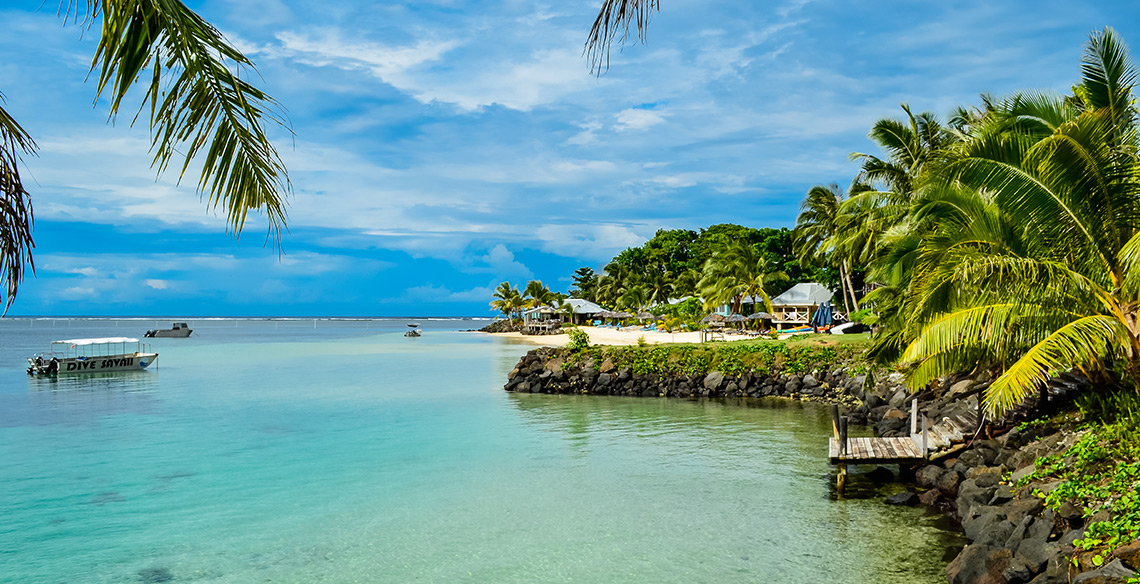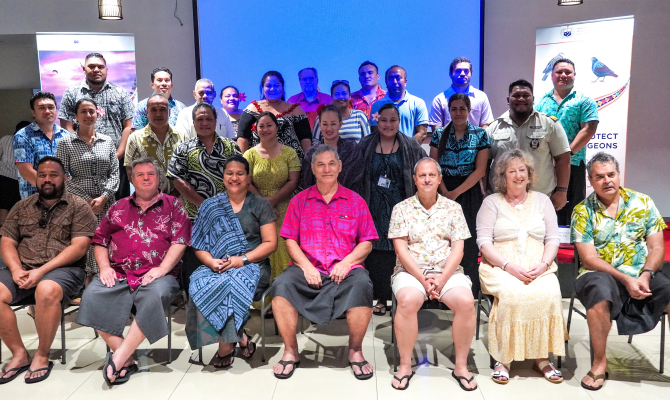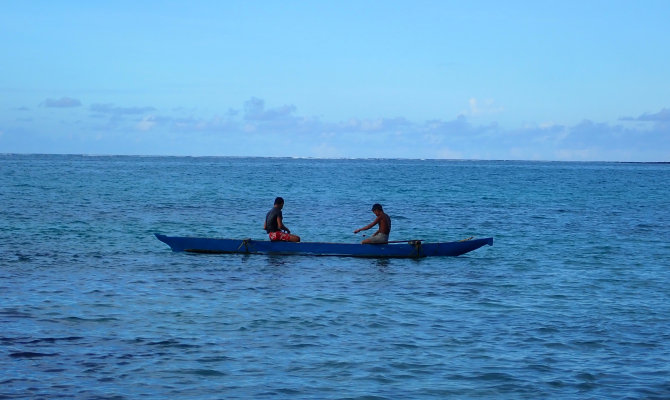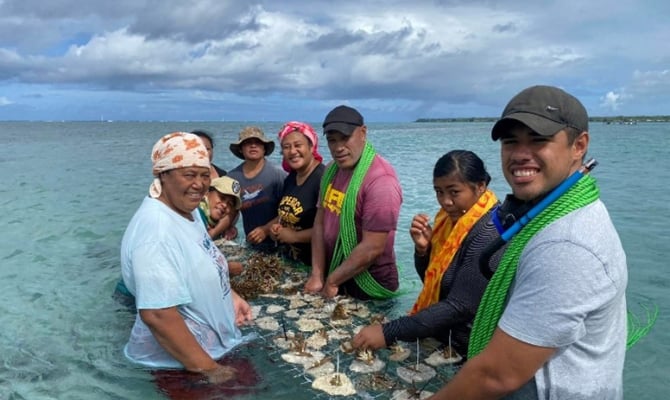Dr Luteru Tauvale tells his story as a young boy on the rural island of Savai’i who turned into one of the contributing Authors of the IPCC report, encouraging Pacific scientists to aim high for their dreams
As a young boy growing up in Safune on the central north coast of the island of Savai’i in Samoa, Afaese Dr Luteru Tauvale, used to envy the kids from the more fancied island of Upolu, where the capital city of Apia is located.
He thought only students who attended schools in Upolu would do great and mighty exploits. That was many, many years ago.
At COP27 in the red sea city of Sharm El-Sheikh this week, that kid from Safune Savai’i who has become one of the most senior Pacific Meteorology scientists can hold his head high. Not only has he proven that kids from Savai’i can achieve high in Samoa as he now occupies the role of Assistant CEO Meteorology Division, Ministry of Natural Resources and Environment (MNRE), they can be just as successful on the international stage.
Dr Luteru has achieved the rare feat of being a contributing Author of the Intergovernmental Panel on Climate Change (IPCC) Working Group I report. The IPCC reports are regarded as the world’s most authoritative sources of climate science, approved by 195 countries.
“Here in Egypt, I feel extremely humbled and blessed,” he said. “I will continue to do more, as long as I can, to make a difference and help our Samoan and Pacific people.”
Part of that includes encouraging more Pacific scientists to follow his footsteps in having their work cited in the IPCC reports, and ultimately play a very key role in influencing the decisions of the UNFCCC process.
“I would definitely like to see more people from the Pacific get involved in this process and make sure what’s happening in the Pacific is reflected in the IPCC,” he said.
“We live in a very challenging time, where there are a lot of disasters. Our reality in terms of these challenges must be reflected in the IPCC which is the main document in the UNFCCC upon which COP decision making are based upon.”
So how did it all start for Dr Luteru?
Well let’s go back to Savai’i where it all began. Born and raised in Safune, he eventually travelled to Upolu to attend Samoa College and later the University Preparatory Year at the National University of Samoa (NUS). From there, he secured a scholarship to study at the University of the South Pacific (USP) where he graduated with a Bachelor of Science, majoring in Physics and Mathematics.
“I went back to Samoa and I was looking for a job relevant to my degree. The Met Office was the only office offering jobs that suited by qualification and from there I was very interested in forecasting,” he recalled.
But for Dr. Luteru, securing a job was the bare minimum. He wanted more.
“When I first started, I saw that not many people were interested in this area of meteorology and climate. When I visited other countries for short term training, I saw that very young people were doing the work, I’m talking about researchers, scientists and so forth,” he said.
“There was a limited number of scientists in the Pacific so I challenged myself and I said that if these people in Asia, the United States and other regions can do this at a young age, there is no reason why someone from Samoa, and the Pacific, cannot do the same.”
So he returned to study, this time as a scholarship student at the Nagoya University in Japan where he graduated with a Doctor of Science in Meteorology (PhD).
“Fortunately, my scholarship allowed me to get into the research side of things. I was lucky to be able to publish some papers and I felt very fortunate that they were published and considered by the IPCC, in particular the issue of tropical cyclones. I feel very humble.”
The need to have the Pacific voice recognised in the international arena was something Dr Luteru recognised quite early in his career at the Samoa Met Services.
“To do forecasts for the future, you need to go back to the past and recognise what has happened,” he said. And that’s what motivated me to go further. In Samoa, I quickly learnt that there were a lot of disasters in the past, there was Cyclone Ofa, Cyclone Val so I thought it’s better to go back and analyse what’s happening and maybe it would improve our capabilities to deal with what’s going to happen in the future. So that’s basically what motivated me.”
The road to where he is today, and being recognised as an Author of the IPCC report, is not easy.
“It’s very hard to get recognised by the IPCC, it’s a lot of hard work, trying to get my research into the IPCC.”
One of the challenges was getting the data, with Dr Luteru noting that qualitative data in an ocean dominated south Pacific is lacking. “We don’t have enough resources, facilities and we rely heavily on our key relevant partners, which are the universities in Australia and NZ to strengthen collaboration and build relationships, so they can help us Pacific islanders to ensure we carry out and conduct researches.”
Despite the challenges, he is optimistic about the future. He is excited about potential partnerships between the world’s largest science and research organisations like CSIRO, and Pacific countries.
“Those are the types of work we are after, we want more collaboration so that these organisations come in and we work with them, they can help us so that what’s happening in our region can be reflected and impacts at the IPCC level. In the next IPCC reports, I would like to see a lot of what’s happening on the ground in the Pacific reflected. I want to do more research, I want a new publication in the next IPCC reports, if time permits.”
So what would be his advice to young Pacific students and scientists?
“Don’t stop dreaming and always challenge yourself,” he said. “When I grew up in Savai’i, I thought things like getting into the IPCC report can only be done by kids from Upolu and that Savai’i kids were not qualified so I had to really challenge myself and say that if kids in Upolu can do it, I believe the kids from Savai’i can do it too.”
More than 15 years into his work with the Samoa Met Service, and standing in Egypt as a contributing Author of the IPCC reports, one can definitely say that kids from Savai’i, like Dr. Luteru, can do just about anything.
The 27th Conference of the Parties to the UN Framework Convention on Climate Change (UNFCCC COP27) is being held in Sharm el-Sheikh, Egypt from 6 to 18 November 2022. It is being attended by Pacific leaders and their delegations, who are advocating for their survival.
This story was written by Sosikeni Lesa, originally published at SPREP on 16 November 2022, reposted via PACNEWS.




